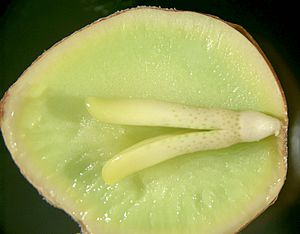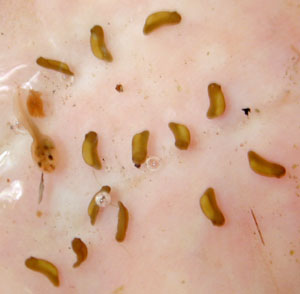Embryo facts for kids

An embryo is the very first stage in the life of a new animal or plant. It starts when a fertilized egg (called a zygote) begins to grow. This stage lasts from the first time its cells divide until it is born, hatches, or starts to sprout from a seed.
For humans, we call it an embryo for about the first eight weeks after fertilization. After that, until birth, it is called a fetus.
Contents
What is an Embryo?
An embryo is like a tiny, developing blueprint for a new living thing. It contains all the instructions needed to grow into a complete animal or plant. Think of it as the very beginning of life for many organisms.
How a New Life Begins
Most animals and plants start as an embryo through a process called sexual reproduction. This happens when two special cells, one from each parent, join together.
- In animals, a sperm cell from the male joins with an egg cell from the female.
- This joining is called fertilization.
- The new single cell formed is called a zygote. This zygote has DNA (genetic instructions) from both parents.
From Zygote to Embryo
Once the zygote is formed, it starts to divide. It makes more and more cells through a process called mitosis. These cells then begin to organize and specialize. This is when the zygote officially becomes an embryo.
Embryo Development
The journey of an embryo growing is called embryogenesis. Scientists who study this amazing process are called embryologists. They learn how a single cell turns into a complex living being.
Stages of Growth
Embryo development happens in several important steps:
- Blastula: The first stage is often a hollow ball of cells.
- Gastrula: Next, cells start to move and rearrange themselves. This forms different layers that will become various parts of the body.
- Morphogenesis: This is when the embryo begins to take shape. Organs and body parts start to form.
- Tissue Differentiation: Cells become specialized to form different tissues, like muscle, nerve, or skin tissue.
Each stage is crucial for the embryo to develop correctly.
Images for kids
See also
 In Spanish: Embrión para niños
In Spanish: Embrión para niños



